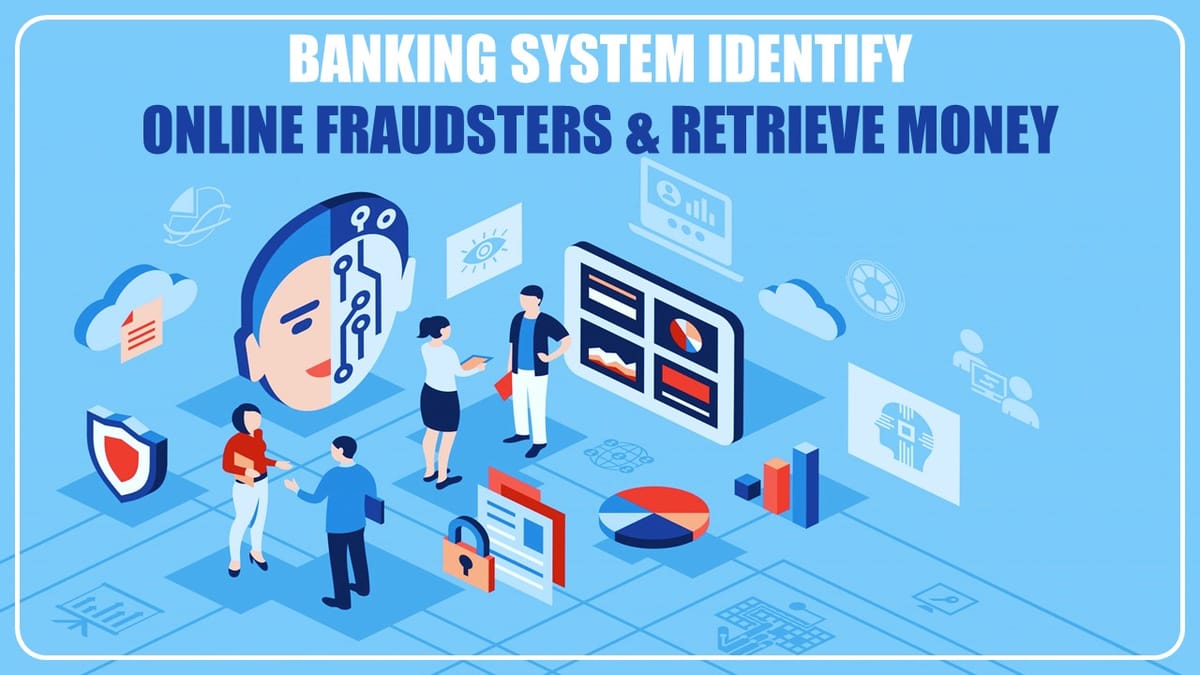Priyanka Kumari | Dec 20, 2023 |

How present banking system identify online fraudsters and retrieve money
The Minister of State Dr Bhagwat Karad in the Ministry of Finance in a written reply to a question raised in Rajya Sabha Sabha said, “ How present banking system identify online fraudsters and retrieve money”.
Shri Sanjay Raut asked these questions in the Rajya Sabha:
Will the Minister of Finance be pleased to state:
(a) whether it is a fact that the cases of digital frauds committed using cards and internet-based payment methods have nearly been doubled as fraudsters are using new techniques to cheat customers;
(b) if so, the details thereof and Government’s reaction thereto;
(c) whether the present banking system is unable to identify the fraudsters and retrieve the money; and
(d) if so, the details of steps taken or proposed to be taken by Government to protect the public money?
The Minister of State replied:
(a) and (b): According to the Reserve Bank of India (RBI), the number of frauds (1 lakh or more) reported by Scheduled Commercial Banks under the categories “Cards/internet – credit cards, cards/internet – debit cards, and cards/internet banking- based on date of reporting” during the financial years 2021-22 and 2022-23 was 3,596 and 6,659, respectively. In the context of the overall expansion of the digital ecosystem, the number of reported frauds is significantly surpassed by an enormous rise in total digital payment transactions during the same period.
(c) and (d): According to the Seventh Schedule to the Indian Constitution, ‘police’ and ‘public order’ are state matters, according to the Ministry of Home Affairs. Through their Law Enforcement Agencies (LEAs), states and territories are principally responsible for the prevention, identification, investigation, and prosecution of crimes, including cyber fraud. The Central Government enhances the efforts of state governments by providing recommendations and financial aid through several capacity-building schemes.
The government additionally launched the National Cyber Crime Reporting Portal to allow the public to report all types of cyber crimes, with a special emphasis on cyber crimes against women and children. Cyber crimes reported on this portal are automatically routed to the respective State/UT law enforcement agency for further handling in accordance with the provisions of law.
The Indian Cyber Crime Coordination Centre (I4C) conducts proactive analysis of digital lending apps on a regular basis. On the basis of its analysis and complaints made on the National Cyber Crime Reporting Portal, the I4C team analyzes Apps on numerous parameters and reports suspicious Apps to MeitY for blockage.
Furthermore, the RBI issued instructions to banks regarding limiting customer liabilities in unauthorized/fraudulent electronic transactions in circulars dated July 6, 2017 and December 14, 2017 for Commercial banks and Cooperative banks, respectively, outlining the criteria for determining the customer’s limited liability in various types of digital transactions.
Several initiatives have been made by the government, the RBI, and banks to raise awareness about cybercrime, especially financial fraud, and to protect citizens’ interests. Among the initiatives taken in this direction are the following:
1. The RBI’s “RBI Kehta Hai” campaign and booklet “BE(A)WARE” educate the public on the measures to be taken when conducting financial transactions using digital platforms.
2. The RBI has developed an initiative for conducting electronic-banking awareness and training (eBAAT), which has primarily focused on raising awareness about fraud and risk reduction.
3. In partnership with the RBI’s Regulated Entities (REs), a Nationwide Intensive Awareness Programme (NIAP) was implemented, with about 1.63 lakh programmes delivered through various channels.
4. The RBI additionally conducts Financial Literacy Week (FLW), and banks are encouraged to hold special camps through Financial Literacy Centres (FLCs) and rural branches.
5. In collaboration with the National Centre for Financial Education (NCFE), the RBI developed a framework for financial education to be included in school students’ education curricula.
6. Dissemination of cybercrime messaging via short message service (SMS), radio compaigns, and public awareness of cybercrime prevention and cyber safety guidelines via the I4C’s social media accounts.
In case of any Doubt regarding Membership you can mail us at [email protected]
Join Studycafe's WhatsApp Group or Telegram Channel for Latest Updates on Government Job, Sarkari Naukri, Private Jobs, Income Tax, GST, Companies Act, Judgements and CA, CS, ICWA, and MUCH MORE!"